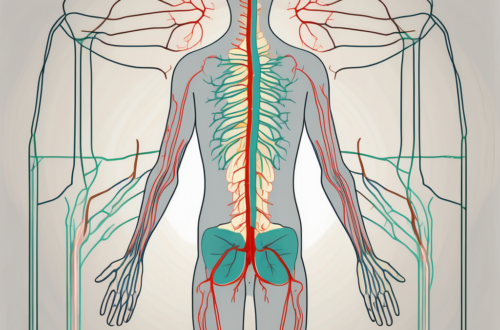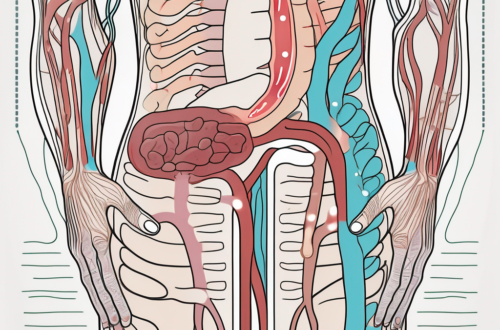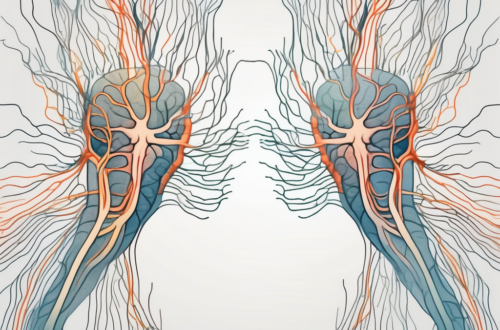The parasympathetic nerve plays a crucial role in the proper functioning of the stomach. Understanding how the parasympathetic nervous system works and its connection to the stomach can provide valuable insights into maintaining gastrointestinal health. In this article, we will explore the structure and functions of the parasympathetic nervous system, its relationship with the stomach, the impact of parasympathetic nerve dysfunction on stomach function, and potential treatments and management strategies. Furthermore, we will discuss emerging trends in parasympathetic nerve research and their potential implications for gastrointestinal health and treatment.
Understanding the Parasympathetic Nervous System
The parasympathetic nervous system is one of the two divisions of the autonomic nervous system, which controls involuntary bodily functions. It works in opposition to the sympathetic nervous system, which is responsible for the “fight or flight” response. Unlike the sympathetic nervous system, the parasympathetic nervous system promotes relaxation and conservation of energy. It primarily operates during restful conditions, allowing the body to recover and replenish its resources.
The Basic Structure of the Parasympathetic Nervous System
The parasympathetic nervous system consists of a series of interconnected nerves that originate from the brainstem and sacral spinal cord. These nerves extend to various organs throughout the body, including the stomach. The main neurotransmitter involved in parasympathetic nerve signaling is acetylcholine, which activates specific receptors on target cells.
Furthermore, the parasympathetic nervous system operates through two primary pathways: the cranial and sacral pathways. The cranial pathway is responsible for regulating functions in the head and upper body, while the sacral pathway controls functions in the lower body.
Functions of the Parasympathetic Nervous System
The parasympathetic nervous system influences a wide range of bodily functions, including digestion, metabolism, and elimination. When it comes to stomach function, the parasympathetic nerve plays a critical role in stimulating the production of gastric acid, pancreatic enzymes, and other substances essential for the breakdown and absorption of food.
Additionally, the parasympathetic nervous system is involved in regulating heart rate and blood pressure. It helps to maintain a steady heart rate and prevent sudden spikes or drops in blood pressure. This is achieved through the release of acetylcholine, which acts on receptors in the heart and blood vessels to promote relaxation and dilation.
Furthermore, the parasympathetic nervous system is responsible for controlling the constriction of the pupils in the eyes. When activated, it causes the pupils to constrict, allowing for better focus on nearby objects. This is particularly important in situations where detailed vision is required, such as reading or examining objects up close.
Moreover, the parasympathetic nervous system is involved in promoting sexual arousal and reproduction. It plays a role in the regulation of sexual functions, including the release of reproductive hormones and the dilation of blood vessels in the genital area. This allows for increased blood flow and sensitivity, enhancing sexual pleasure and facilitating the process of reproduction.
Furthermore, the parasympathetic nervous system is crucial for maintaining a healthy urinary system. It helps regulate bladder function by stimulating the contraction of the bladder muscles and relaxing the muscles of the urinary sphincter. This coordination ensures proper urine storage and elimination, preventing urinary incontinence and promoting optimal urinary health.
Lastly, the parasympathetic nervous system is involved in promoting overall relaxation and restorative processes in the body. It helps to reduce stress and anxiety by slowing down heart rate, promoting deep breathing, and enhancing feelings of calmness and tranquility. This state of relaxation allows the body to conserve energy and focus on essential repair and regeneration processes, contributing to overall well-being and vitality.
The Parasympathetic Nerve and the Stomach
Understanding the connection between the parasympathetic nerve and the stomach is crucial for comprehending how stomach function is regulated. The parasympathetic nerve innervates the smooth muscles of the stomach and controls its contraction and relaxation. Additionally, it influences the release of various hormones involved in digestion and nutrient absorption.
The Connection Between the Parasympathetic Nerve and the Stomach
The parasympathetic nerve sends signals to the stomach through neural pathways, triggering the release of acetylcholine. This neurotransmitter binds to receptors on the muscle cells of the stomach, leading to increased motility and secretion. Consequently, this enhanced activity facilitates the movement and breakdown of food in the stomach, ensuring optimal digestion and absorption of nutrients.
The parasympathetic nerve fibers responsible for innervating the stomach originate from the vagus nerve, one of the cranial nerves. These fibers travel down the esophagus and reach the stomach, forming an intricate network that spreads throughout the smooth muscle layers. This extensive innervation allows for precise control over stomach function.
Upon activation, the parasympathetic nerve fibers release acetylcholine, which binds to muscarinic receptors located on the smooth muscle cells. This binding triggers a cascade of intracellular events, leading to the contraction of the stomach muscles. These contractions, known as peristalsis, propel the food forward and mix it with digestive enzymes and gastric acid, ensuring thorough digestion.
How the Parasympathetic Nerve Influences Stomach Function
The parasympathetic nerve exerts its influence on the stomach through several mechanisms. Firstly, it stimulates the release of gastric acid, facilitating the breakdown of food and the activation of digestive enzymes. The increased acidity in the stomach creates an optimal environment for the enzymes to function, enabling efficient digestion.
Furthermore, the parasympathetic nerve promotes the secretion of mucus, which protects the stomach lining from acid-related damage. The mucus forms a protective barrier, preventing the acid from directly contacting the delicate stomach tissues. This protective mechanism ensures the stomach remains healthy and free from ulcers or other damage.
Additionally, the parasympathetic nerve enhances blood flow to the stomach, ensuring optimal nutrient delivery and absorption. The increased blood flow brings essential nutrients and oxygen to the stomach cells, supporting their metabolic needs. This enhanced circulation also aids in the removal of waste products, maintaining a healthy environment within the stomach.
Overall, the parasympathetic nerve plays a vital role in regulating stomach function. Through its intricate network of neural pathways and release of acetylcholine, it controls the contraction and relaxation of the stomach muscles, stimulates the release of gastric acid and mucus, and enhances blood flow. Understanding the connection between the parasympathetic nerve and the stomach provides valuable insights into the complex mechanisms that ensure efficient digestion and nutrient absorption.
The Impact of Parasympathetic Nerve Dysfunction on the Stomach
When the parasympathetic nerve does not function properly, it can have detrimental effects on stomach function. Parasympathetic nerve dysfunction can manifest in various ways, leading to symptoms that negatively impact digestion and overall gastrointestinal health.
The parasympathetic nervous system plays a crucial role in regulating the body’s rest and digest response. It is responsible for stimulating the production of digestive enzymes and gastric acid, as well as promoting gastric motility. However, when this system malfunctions, it can disrupt the delicate balance of stomach function.
Symptoms of Parasympathetic Nerve Dysfunction
Common symptoms of parasympathetic nerve dysfunction may include decreased gastric motility, reduced production of digestive enzymes and gastric acid, and impaired nutrient absorption. This can result in bloating, indigestion, constipation, and malnutrition. It is important to note that these symptoms can vary in severity depending on the extent of parasympathetic nerve dysfunction and individual factors.
Decreased gastric motility, or the movement of food through the stomach, can lead to a feeling of fullness and discomfort after meals. This can be especially troublesome for individuals who rely on regular, efficient digestion to maintain their energy levels throughout the day. Reduced production of digestive enzymes and gastric acid can hinder the breakdown of food, making it more difficult for the body to extract essential nutrients.
Impaired nutrient absorption is another consequence of parasympathetic nerve dysfunction. When the stomach is not functioning optimally, the body may struggle to absorb nutrients from food, leading to deficiencies and malnutrition. This can have far-reaching effects on overall health, as essential vitamins, minerals, and macronutrients are not properly utilized by the body.
The Effect of Parasympathetic Nerve Dysfunction on Digestion
When parasympathetic nerve dysfunction hampers stomach function, it can disrupt the overall digestive process. Inadequate gastric acid production may impair food breakdown, leading to less efficient nutrient absorption. Reduced motility can result in delayed emptying of the stomach, causing discomfort and slowing down the digestive process. These disruptions can impact nutrient absorption, energy levels, and overall gastrointestinal health.
Furthermore, the impaired digestion caused by parasympathetic nerve dysfunction can lead to an imbalance in gut bacteria. The stomach’s acidic environment helps to control the growth of harmful bacteria, but when gastric acid production is reduced, this balance can be disrupted. This can increase the risk of bacterial overgrowth and infections in the gastrointestinal tract, further exacerbating digestive issues.
In addition to the physical symptoms, parasympathetic nerve dysfunction can also have psychological effects. The gut-brain connection is well-established, and disruptions in stomach function can contribute to feelings of anxiety, stress, and even depression. This highlights the importance of addressing parasympathetic nerve dysfunction not only for physical well-being but also for mental health.
In conclusion, parasympathetic nerve dysfunction can have a significant impact on stomach function and overall gastrointestinal health. The symptoms can range from mild discomfort to severe digestive issues and malnutrition. It is crucial to seek medical attention if you suspect parasympathetic nerve dysfunction, as proper diagnosis and treatment can help restore stomach function and improve overall well-being.
Treatment and Management of Parasympathetic Nerve Dysfunction
Managing parasympathetic nerve dysfunction requires a comprehensive approach aimed at addressing the underlying causes and alleviating symptoms. It is important to note that treatment should always be carried out under the guidance of a medical professional, as they can provide personalized recommendations based on individual circumstances.
Parasympathetic nerve dysfunction, also known as parasympathetic neuropathy, occurs when the parasympathetic nervous system, which controls involuntary bodily functions, becomes impaired. This can lead to a range of symptoms, including digestive issues, such as acid reflux and constipation.
Medical Interventions for Parasympathetic Nerve Dysfunction
In some cases, medical interventions may be necessary to manage parasympathetic nerve dysfunction. This may include medications that help regulate nerve function or address specific symptoms such as acid reflux or constipation. It is crucial to consult with a healthcare professional who specializes in gastrointestinal health to determine the most appropriate course of treatment.
Medications commonly used to manage parasympathetic nerve dysfunction include proton pump inhibitors (PPIs) to reduce stomach acid production, laxatives to relieve constipation, and prokinetic agents to improve gastrointestinal motility. These medications can help alleviate symptoms and improve overall digestive function.
Lifestyle Changes to Improve Parasympathetic Nerve Function
Besides medical interventions, lifestyle modifications can play a significant role in improving parasympathetic nerve function and promoting overall gastrointestinal health. These may include adopting a balanced diet rich in fiber, staying hydrated, managing stress through relaxation techniques, getting regular exercise, and prioritizing adequate sleep. Consulting with a healthcare professional or a registered dietitian can provide valuable guidance on making impactful lifestyle changes.
A diet rich in fiber can help regulate bowel movements and prevent constipation, a common symptom of parasympathetic nerve dysfunction. Including fruits, vegetables, whole grains, and legumes in your diet can provide the necessary fiber to promote healthy digestion. Additionally, staying hydrated by drinking enough water throughout the day can help maintain optimal digestive function.
Stress management techniques, such as deep breathing exercises, meditation, and yoga, can help reduce the impact of stress on the parasympathetic nervous system. Chronic stress can disrupt nerve function and exacerbate symptoms of parasympathetic nerve dysfunction. Engaging in regular exercise, such as walking, swimming, or cycling, can also have a positive impact on nerve function and overall well-being.
Lastly, prioritizing adequate sleep is essential for the proper functioning of the parasympathetic nervous system. Aim for 7-9 hours of quality sleep each night to support optimal nerve function and promote overall health.
Future Research Directions in Parasympathetic Nerve and Stomach Function
The field of parasympathetic nerve research continues to advance, leading to new insights into the relationship between the parasympathetic nervous system and stomach function. Emerging trends in research are shedding light on potential avenues for further exploration and promising implications for gastrointestinal health and treatment.
Emerging Trends in Parasympathetic Nerve Research
Recent studies have revealed the influence of the parasympathetic nervous system on the gut-brain axis, which highlights the bidirectional communication between the brain and the gastrointestinal system. This area of research explores the complex interplay between neural, hormonal, and immune pathways and their impact on digestive health. Moreover, advancements in neuroimaging techniques and molecular biology are enabling researchers to delve deeper into the intricate workings of the parasympathetic nervous system.
One emerging trend in parasympathetic nerve research is the investigation of the role of the vagus nerve in regulating stomach function. The vagus nerve, a major component of the parasympathetic nervous system, is responsible for transmitting signals between the brain and the digestive system. Recent studies have shown that vagal activity can modulate gastric motility, acid secretion, and nutrient absorption. Understanding the specific mechanisms by which the vagus nerve influences stomach function could potentially lead to the development of targeted therapies for gastrointestinal disorders.
Another area of interest in parasympathetic nerve research is the exploration of the enteric nervous system, which is often referred to as the “second brain” of the body. The enteric nervous system consists of a complex network of neurons that are embedded in the walls of the gastrointestinal tract. It plays a crucial role in regulating various aspects of stomach function, including peristalsis, secretion of digestive enzymes, and local immune responses. Investigating the intricate connections between the enteric nervous system and the parasympathetic nervous system could provide valuable insights into the underlying mechanisms of gastrointestinal disorders and pave the way for novel therapeutic interventions.
Potential Implications for Gastrointestinal Health and Treatment
As our understanding of the parasympathetic nerve and stomach function deepens, it holds the possibility of developing innovative treatments and interventions for gastrointestinal disorders. Investigating the role of the parasympathetic nervous system in conditions such as irritable bowel syndrome (IBS), gastroparesis, and functional dyspepsia may offer potential therapeutic targets and personalized treatment approaches in the future.
For instance, recent studies have suggested a link between parasympathetic dysfunction and the development of functional dyspepsia, a common gastrointestinal disorder characterized by chronic pain or discomfort in the upper abdomen. By elucidating the specific mechanisms underlying parasympathetic dysfunction in functional dyspepsia, researchers may be able to develop targeted therapies that restore normal parasympathetic activity and alleviate symptoms.
Furthermore, understanding the intricate interplay between the parasympathetic nervous system and the gut microbiota could open up new avenues for the treatment of gastrointestinal disorders. The gut microbiota, a complex community of microorganisms residing in the gastrointestinal tract, has been implicated in various aspects of digestive health. Recent research has shown that the parasympathetic nervous system can modulate the composition and activity of the gut microbiota, which in turn can influence stomach function. Manipulating the gut microbiota through probiotics, prebiotics, or fecal microbiota transplantation could potentially restore parasympathetic balance and improve gastrointestinal health.
In conclusion, the parasympathetic nerve plays a vital role in stomach function. Understanding its structure, functions, and connection to the stomach can provide valuable insights into maintaining gastrointestinal health. Parasympathetic nerve dysfunction can have significant implications for digestion and overall well-being. Seeking appropriate medical guidance and adopting lifestyle changes are crucial steps in managing parasympathetic nerve dysfunction. Exciting developments in parasympathetic nerve research hold promise for advancements in gastrointestinal health and treatment. As research continues, a deeper understanding of the parasympathetic nerve’s role in stomach function may lead to improved diagnostics, therapeutics, and ultimately better outcomes for individuals dealing with gastrointestinal disorders.





